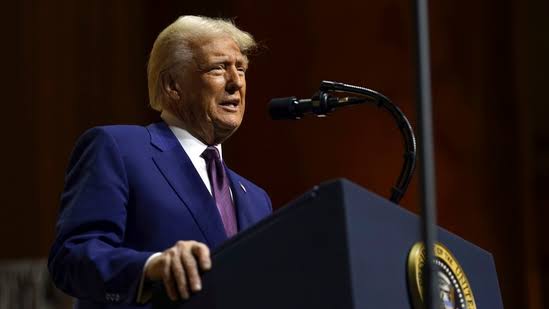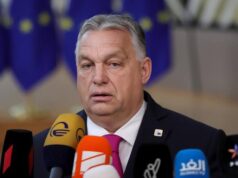World War III was ‘not so far away’ When Biden – Harris ruled USA

US President Donald Trump electoral victory was crucial in preventing World War III.
Trump has asserted that a Kamala Harris-led administration would have plunged the world into a global conflict within a year.
Trump made these remarks on February 19 during an event hosted by the Future Investment Initiative Institute in Miami Beach, an organization backed by Saudi Arabia’s sovereign wealth fund.
The president reiterated his commitment to being remembered as “a peacemaker and a unifier,” highlighting the resolution of conflicts in the Middle East and Ukraine as key foreign policy goals.
“There’s no profit for anyone in having World War III, and you’re not so far away from it,” Trump told the audience. “If we would have had this administration for another year, you would have been in World War III, and now it’s not going to happen.”
His comments come against a backdrop of ongoing global tensions, including the Russia-Ukraine war and volatile situations in the Middle East. Trump’s claim underscores his belief that his foreign policy approach has helped avert a catastrophic escalation of conflicts.
Trump has repeatedly criticized the previous administration led by Joe Biden, with Kamala Harris as vice president, accusing them of incompetence and mismanagement, particularly in handling the Russia-Ukraine conflict.
Trump has consistently argued that the war in Ukraine would not have occurred under his leadership, citing his diplomatic stance toward both Russia and Ukraine as evidence of his ability to maintain peace.
Biden, in his farewell address at the State Department last month, emphasized the importance of “rallying the world to defend Ukraine” and avoiding a direct confrontation between nuclear powers.
However, Trump dismissed Biden’s approach as ineffective, suggesting that his administration had only exacerbated tensions.
Trump’s recent remarks also highlighted the significance of diplomatic engagements facilitated by Saudi Arabia.
Earlier this week, senior officials from Russia and the United States met in Riyadh to discuss repairing strained relations-a dialogue Trump praised as a significant step toward resolving the Ukraine crisis.
He commended Saudi Arabia’s role in fostering the discussions, which he described as “highly successful.” This development aligns with Trump’s broader foreign policy vision, which emphasizes diplomacy and strategic partnerships to de-escalate global conflicts.
The diplomatic talks in Saudi Arabia have sparked tension between Trump and Ukrainian President Volodymyr Zelensky. Zelensky criticized the discussions, insisting that any negotiations regarding the conflict should include Ukraine’s direct involvement.
Trump, however, rebuked Zelensky, calling him a “dictator without elections” and accusing him of draining American resources while resisting diplomatic solutions with Russia.
“Zelensky wants to keep the gravy train going,” Trump said, referring to the billions of dollars in aid provided to Ukraine by the United States. He warned that Zelensky must act swiftly to resolve the conflict, cautioning that failure to do so could result in Ukraine losing its sovereignty.
These remarks reflect Trump’s long-standing skepticism of prolonged foreign aid commitments and his emphasis on achieving swift diplomatic resolutions.
The exchange between Trump and Zelensky also extended to public opinion, with Zelensky accusing Trump of spreading “Russian disinformation” regarding his approval ratings in Ukraine.
Zelensky cited a poll conducted by a Kiev-based survey firm that indicated continued public support for his leadership. Trump, however, dismissed these findings, claiming that he relied on “real Ukrainian polls” that paint a different picture of Zelensky’s popularity.
Throughout his presidency, Trump has positioned himself as a leader committed to preventing global conflicts through diplomacy and pragmatic foreign policy. His criticism of the Biden-Harris administration reflects his belief that their approach would have led to escalated tensions and potentially catastrophic outcomes.
Trump’s focus on resolving the Russia-Ukraine conflict and fostering stability in the Middle East underscores his broader strategy of prioritizing American interests while promoting global peace.
Looking ahead, Trump’s administration is expected to continue pursuing diplomatic engagements with key global players, leveraging partnerships with countries like Saudi Arabia to facilitate dialogue and conflict resolution.
However, his confrontational stance toward leaders like Zelensky could complicate efforts to maintain alliances and address ongoing crises.
Trump’s assertion that World War III was “not so far away” under a Harris-led administration highlights the stakes of his foreign policy agenda.
By emphasizing his role as a “peacemaker and unifier,” Trump seeks to position his presidency as a stabilizing force in an increasingly volatile world.
As diplomatic efforts continue in regions like Ukraine and the Middle East, the success of Trump’s approach will ultimately be judged by its ability to achieve lasting peace and prevent the global conflicts he has warned against.




